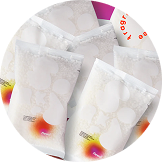Magnesium deficiency can manifest itself in the form of constant physical and mental tension, poor sleep, fatigue, difficulty concentrating, and more. After all, this essential mineral influences more than 300 unique bodily processes!
But, it’s not as simple as choosing the first magnesium supplement you come across. There are so many different delivery methods and even more types of magnesium at your disposal. You need to take the time to weigh your options and pick the right one.
We’ll simplify things for you with this detailed comparison of magnesium chloride vs magnesium citrate. So, what’s the difference between magnesium chloride and magnesium citrate? More importantly, is magnesium chloride better than magnesium citrate? Let’s break it down!
Magnesium chloride is the gold standard for its incredible bioavailability, versatile range of benefits, and it doesn’t produce any side effects when applied topically (to the skin).
Magnesium citrate, on the other hand, does one thing really well: it relieves constipation. This can be a benefit or a side effect depending on your situation. If you don’t need help with regularity, you’ll have a hard time making the case for this form.
We’ll dive deeper into the differences between magnesium citrate vs chloride below. But if you just want to bring the benefits of magnesium chloride into your self-care routine, try a magnesium bath soak from Flewd Stresscare. Get back to living life without limits today!
What’s the Difference Between Magnesium Chloride and Magnesium Citrate?
From regulating nerve activity to supporting muscle function, energy production, and even the body’s ability to manage stress and sleep, you could argue that magnesium is among the most important nutrients for human health and happiness.
But magnesium isn’t necessarily available in many dietary sources, so supplementation is essential. This is where things get tricky, since not all forms are created equal. In fact, some types of magnesium could cause more harm than good.
Some forms are poorly absorbed. Others can cause digestive issues that outweigh any potential benefit. That’s why choosing the right type of magnesium matters. So, what’s the difference between magnesium chloride and magnesium citrate?
Overview of Magnesium Chloride
As the name suggests, this is a combination of magnesium and chloride. It’s typically sourced from natural saltwater or brine and is known for being highly soluble in water, which makes it one of the most bioavailable forms of magnesium, especially when used topically.
This is really the biggest advantage of magnesium chloride vs magnesium citrate, and just about any other form of magnesium for that matter. It’s a perfect candidate for transdermal intake so you can bypass the digestive tract altogether.
This means it can get into the bloodstream and be sent throughout the body to wherever it’s needed most, fast. But the best part is you won’t deal with any digestive discomfort along the way!
Whether you’re on the hunt for the best magnesium for stress or the best magnesium for sleep, this is it. It’s also commonly used to address physical tension, like in our muscle bath soak.
Magnesium chloride helps regulate the nervous system, supports muscle recovery, and activates calming neurotransmitters like GABA. It’s as close to a jack of all trades as you’ll find when it comes to magnesium.
That’s why we use it across all our bath soaks, from our anxiety bath soak to our serotonin bath soak, stress relief bath soak, and everything in between. More on that in a moment - let’s look at the other side of our magnesium chloride vs magnesium citrate comparison first.
Overview of Magnesium Citrate
Magnesium citrate combines magnesium with citric acid, and is usually taken as an oral supplement rather than transdermally. As we’ll examine throughout the rest of this guide, that’s why it falls short.
It’s a great way to relieve occasional constipation since it has a gentle laxative effect. It has decent absorption through the digestive system, but this is where the benefits end and the downsides begin.
Magnesium citrate draws water into the intestines, leading to bloating or loose stools. The more you take, the more pronounced this effect is. Unfortunately, high doses of magnesium citrate are needed since it has relatively low bioavailability compared to what humans actually need.
This is why magnesium citrate really isn't a great fit for addressing sleep or stress issues. It doesn’t calm the nervous system as effectively as other forms and often causes discomfort that limits consistent use. It won’t have much of an impact on physical discomfort, either.
The difference between magnesium chloride and magnesium citrate is pretty jarring. But it becomes even more apparent which is better when you compare magnesium citrate vs chloride side by side - so let’s take a closer look below.
Magnesium Chloride vs Magnesium Citrate: Comparing Bioavailability, Results, and Side Effects
While all forms of magnesium bring something unique to the table, only one does it all without the drawbacks - that’s magnesium chloride. It’s effective for a variety of use cases, and it’s gentle on the body.
But be clear - magnesium citrate DOES have its place. So, when is magnesium chloride better than magnesium citrate, and vice versa? We’ll get to the bottom of things below.
How Effectively Is Each Form Absorbed?
Absorption is everything when taking a magnesium supplement. You need to know exactly how much you’re getting out of every serving so you can overcome deficiency and all its nasty side effects.
This is where the real magic of magnesium chloride comes from. It’s highly bioavailable, absorbing efficiently transdermally. It’s the most effective epsom salt alternative for this reason.
You can bypass the digestive system entirely when you apply it to the skin through a bath soak or balm, and let magnesium get into the bloodstream for fast results.
On the other hand, magnesium citrate is really only found in pills, powders, and capsules. It’s an oral solution, and that’s where a lot of the issues arise from. It’s not the least bioavailable form of magnesium, but it certainly doesn’t compare to magnesium chloride.
It’s also hard to say with any level of confidence just how much of it your body is actually retaining and putting to use. Magnesium citrate absorption rates are dependent on digestive health and timing with meals.
What Does Each Form Actually Do Best?
Choosing between magnesium chloride vs magnesium citrate is fairly simple when you narrow it down to your goals. Like we said earlier, magnesium citrate is good for just one thing: short-term bowel relief. It’s commonly used as a mild laxative to relieve occasional constipation.
While it may supply magnesium in general to offset deficiency, its low bioavailability makes it a poor candidate for broad supplementation. Magnesium chloride is a better fit for this - and it brings a wealth of other benefits to the table as well.
Magnesium chloride can help calm the nervous system, ease muscle tension, and support restorative sleep. It’s a good catch-all for any magnesium deficiency concerns.
Potential Side Effects and Tolerability
The last thing you want is to deal with digestive discomfort when trying to overcome magnesium deficiency. Unfortunately, this is the outcome with just about any oral form of magnesium. Transdermal intake is the way to go when it comes to minimizing side effects.
Not to sound like a broken record, but this is why magnesium chloride is the obvious choice. It avoids common GI issues like bloating or diarrhea and is gentle enough for regular use. Rare side effects may include slight skin irritation, but this is not likely with our bath soaks at Flewd.
In contrast, magnesium citrate’s one benefit is often looked at as a side effect: it can cause loose stools, abdominal cramping, or discomfort at higher doses. It’s often seen as more disruptive than helpful at the end of the day.
Long-Term Use and Lifestyle Fit
Magnesium chloride fits naturally into wellness routines, especially if you already love relaxing in a nice, warm bath at the end of the day. It’s the perfect pairing for your self-care ritual when you want a little “you time.”
We’ll talk more about this momentarily, but all it takes is 3 soaks a week to replenish your magnesium levels and offset all the consequences of deficiency. No need to stress about meal timing or remembering to take your capsules for the day.
Magnesium citrate isn’t meant to be a long-term solution. It’s something you rely on when you need help getting things moving, so to speak. Its laxative properties can interfere with nutrient absorption if overused, and its utility beyond bowel regulation is limited.
So, is Magnesium Chloride Better Than Magnesium Citrate?
You can probably arrive at your own conclusion at this point. Just in case you’re still on the fence, though, is magnesium chloride better than magnesium citrate? We think so.
Magnesium chloride is the more versatile and user-friendly option when it comes to regular stress relief, muscle recovery, or sleep support. It’s well absorbed, easy on the body, and effective across multiple areas of wellness.
Even compared to other types of magnesium, you’ll find that magnesium chloride is the superior choice. We’ve written similar resources comparing magnesium sulfate vs magnesium chloride, magnesium oxide vs magnesium chloride, and magnesium glycinate vs magnesium chloride.
So, don’t overcomplicate the decision to supplement your body and mind with magnesium. Make the smart choice with magnesium chloride - and more specifically, our bath soaks here at Flewd Stresscare.
Feel the Difference Firsthand With Flewd Stresscare’s Magnesium Chloride Bath Soaks!
Flewd is built on a simple idea: stress relief should be functional, effective, and rooted in how your body actually works. That’s why we formulate all of our soaks with magnesium chloride.
We're not in the business of temporary fixes or overly perfumed tubs. We make purpose-driven products designed to help real people feel better, whether your issue is tight muscles, restless nights, or a nervous system stuck in high gear. Here are our most popular products:
- Ache Erasing: Magnesium, vitamins C & D, and omega-3s to ease soreness and inflammation. Bright orange citrus scent with blood orange, mandarin, and effervescent notes.
- Anxiety Destroying: Magnesium, B-complex, and zinc to support mood balance and calm overstimulation. Scented with lime rind, sea salt, and a hint of white florals.
- Insomnia Ending: Magnesium, vitamins A & E, and L-carnitine to support sleep cycle regulation. Fragrance is a crisp blend of yuzu, grapefruit, and soft floral base notes.
- Sads Smashing: Magnesium, B3, B6, and lithium orotate to help regulate serotonin and emotional stability. Smells like post-rain desert air with green, mint, and wood.
- Rage Squashing: Magnesium, chromium, and B12 to help balance adrenaline and cortisol. Earthy jasmine, pine, leather, and spice profile.
- Panic Crushing: Magnesium, boron, and omega-3s to help the body downshift from hormonal spikes. Warm, grounding scent with spice, soft woods, and floral depth.
Every soak is vegan, cruelty-free, and free from synthetic dyes, parabens, or artificial fragrance. They’re so easy to incorporate into your wellness regimen, too. Run a full tub of warm water, pour in the full contents of one pouch, and soak for at least 15 minutes.
It’s that easy. No need to rinse off afterward, though that’s fine if you do. But because of the nature of our ingredients, they’re fine to leave on the skin if you choose. Soak as often as you want, though we suggest at least 3 times a week for best results.
Pair it with your nightly routine or use it when your system needs a reset. There’s never a bad time for a Flewd Stresscare soak - join over 100,000 happy customers who made our soaks a part of their self-care routine today!
Bringing Our Magnesium Citrate vs Chloride Comparison to a Close
We hope this comparison of magnesium chloride vs magnesium citrate has left you with complete clarity, not just on differences, but on how to make the most of magnesium in your life.
In closing, these forms of magnesium serve different purposes. Only one is built for long-term stress support, sleep, and recovery. Citrate may help with occasional constipation, but its side effects limit everyday use.
Magnesium chloride offers broader benefits - calming the nervous system, easing tension, and absorbing efficiently through the skin without disrupting digestion. It’s the form we trust because it works with your body, not against it.
Don’t just take our word for it. Experience the difference of stress care that actually supports your system firsthand with our bath soaks! Ease into better nights and calmer days with Flewd’s functional soaks today.



















































